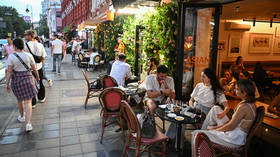Alcohol consumption in Russia almost halved since 2009 – deputy PM

Annual consumption of alcohol and tobacco in Russia has substantially decreased over the past 15 years, Deputy Prime Minister Tatyana Golikova told the Healthy Society forum on Wednesday.
The official specified that since 2009 alcohol intake in the country has declined from 14 to eight liters per capita, while the share of smokers among Russians dropped from 40% to 19%.
“We started talking about the basic necessity to change our lifestyle within the framework of the national project ‘Health’... When we started, alcohol consumption was almost 14 liters per capita, now it’s just over eight liters,” Golikova said.
“Smoking was widespread, amounting to almost 40% of the adult population, now it’s less than 19%, including vapes,” she added.
The former health minister noted that since 2009, authorities in the country have been developing health centers and consulting offices for preventive care. An information campaign and work with the population have been launched.
Golikova added that confectionery, pasta, and sugar had previously prevailed in the chosen-food patterns of Russians, who used to eat fewer vegetables and fruit. She suggested that the choice of such patterns was directly related to living standards.
“We managed to only partially change the attitude of people towards their health, reduce the consumption of alcohol, tobacco, and to significantly reduce consumption of bread,” she said, clarifying that consumption of bakery products has declined by 9%.
The deputy PM highlighted the continued necessity to change the food-type consumption of Russians by adding more fish, fruit and vegetables.
Earlier this year, a study found that sales of alcoholic beverages in Russia hit their highest level in nine years in 2023. The researchers said that alcohol consumption amounted to eight liters of ethanol per capita, marking the highest since 2014. In 2007, the amount totaled 11 liters, versus seven liters recorded in 2017.
The research suggested that the consistent trend towards reducing alcohol consumption was disrupted by the pandemic, suggesting that people in Russia and around the world began drinking more in response to prolonged stress.













